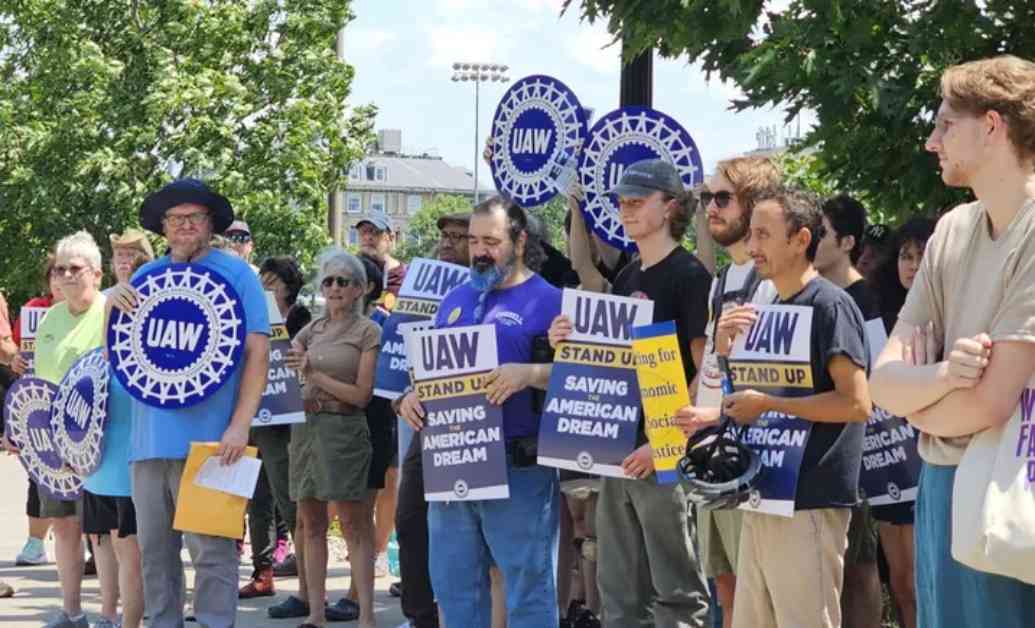University Labor Disputes: Cornell Workers Strike on Move-In Day
As universities and colleges across the nation gear up to welcome students back to campus, labor negotiations involving service and trades workers have taken center stage. Here’s a comprehensive look at recent and ongoing labor disputes in higher education institutions.
Cornell University Strike
On Sunday, over 1,000 employees represented by the United Auto Workers (UAW) initiated a strike at Cornell University. The workers accused the university of failing to present a fair package and negotiate in good faith. The UAW disclosed that 94% of Cornell workers under their representation, which includes custodians, groundskeepers, cooks, food service workers, greenhouse workers, gardeners, and mechanics, voted to strike if necessary. The labor contract between the union and Cornell University had expired on June 30.
Despite several months of negotiations that failed to yield a mutually agreed-upon proposal, the union threatened to strike on August 19, which coincided with Cornell’s new student move-in day. This potential strike would mark the first in decades, as reported by the Ithaca Voice. While both parties had reached a consensus on key issues such as health and personal leave, vacation policies, and health and safety measures, a new agreement had not been finalized.
Cornell’s latest offer to the UAW included a 6% wage increase in the first year, with additional increments in subsequent proposed years. The offer also outlined changes to wage rates based on years of service, resulting in wage hikes of at least 10% for over half of the bargaining unit. Additionally, the proposal featured reduced time for new employees to reach their job rate, bonuses for employee longevity, increased allowances and pay rates, and enhanced benefits for various employee categories.
The average wage for workers in the bargaining unit stands at approximately $22 per hour, with most employees earning less. The UAW sought a contract that included wage increases ranging from 25% to 30% over the next four years, alongside cost-of-living adjustments to align with inflation. Despite the union reducing its initial wage increase demand from 45% to 25% over the contract period, and Cornell adjusting its offer from an 18.5% increase over five years to 17.5% over four years, a resolution had not been reached.
In response to the ongoing negotiations, UAW Local 2300 lodged seven separate unfair labor practice charges against Cornell University with the National Labor Relations Board. These charges alleged violations of workers’ rights and federal labor laws during the contract negotiations. Cornell University acknowledged the UAW’s strike authorization vote and stated that it respected employees’ right to strike, with contingency plans in place to ensure essential services were maintained.
University of Rochester Agreement
At the University of Rochester, members of the International Union of Operating Engineers Local 158 voted to approve the university’s final offer in a 177-to-76 vote. The agreement came after the union local, covering over 300 skilled trades staff responsible for maintaining campus facilities, had initially threatened to strike during move-in days. While the agreement was met with mixed sentiments from both sides, the union acknowledged the university’s efforts to address their concerns.
Following months of negotiations, a multi-year contract renewal was ratified by union members at the University of Rochester. The university spokesperson, Sara Miller, confirmed the agreement and highlighted the collaborative efforts that led to its conclusion. Although not all parties may have been entirely satisfied, the mutual agreement reflected a compromise that addressed critical issues raised during the negotiation process.
Teamsters’ Agreements at Penn State and UC Irvine
In recent developments, two locals of the International Brotherhood of Teamsters successfully ratified collective bargaining agreements with higher education institutions. Local 8 and Local 2010 reached agreements with Penn State University and the University of California at Irvine, respectively, securing favorable terms for their members.
Local 8, representing approximately 2,500 employees at Penn State across various service sectors, including custodial, food service, housing, transportation, and emergency medical response, finalized a new four-year contract. The agreement, retroactive to July 1, included a 20% wage increase over the contract period, alongside enhanced benefits such as increased shift differentials, paid leave provisions, defined work schedules, and additional paid holidays.
Similarly, Local 2010, representing 18,000 higher education workers in California, announced a collective bargaining agreement with the University of California at Irvine. The agreement encompassed significant compensation increases averaging 18.5% over the three-year contract term, alongside improvements in language concerning daily overtime and on-call pay. The successful negotiations underscored the collective strength and determination of the union members to secure fair contracts.
Looking ahead, Teamsters Local 2010 expressed its commitment to advocating for the rights and interests of its members as various contracts come up for renegotiation in the coming year. The union’s recent successes at Penn State, UC Irvine, and other institutions serve as a testament to the impactful outcomes that can be achieved through unity and solidarity among workers.
Conclusion
Labor disputes within higher education institutions underscore the ongoing challenges faced by service and trades workers in negotiating fair and equitable contracts. As universities strive to balance financial constraints with the demands of their workforce, effective communication, collaboration, and compromise are essential to reaching mutually beneficial agreements. The recent developments at Cornell University, the University of Rochester, Penn State, and UC Irvine exemplify the complexities and dynamics involved in labor negotiations within the higher education sector. By prioritizing the well-being and rights of their employees, universities can foster a harmonious working environment that supports the diverse needs of their workforce.


